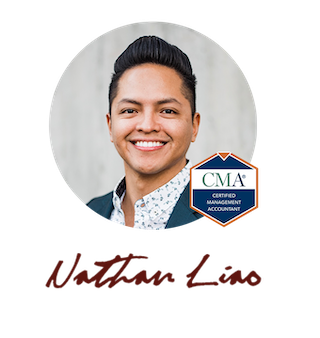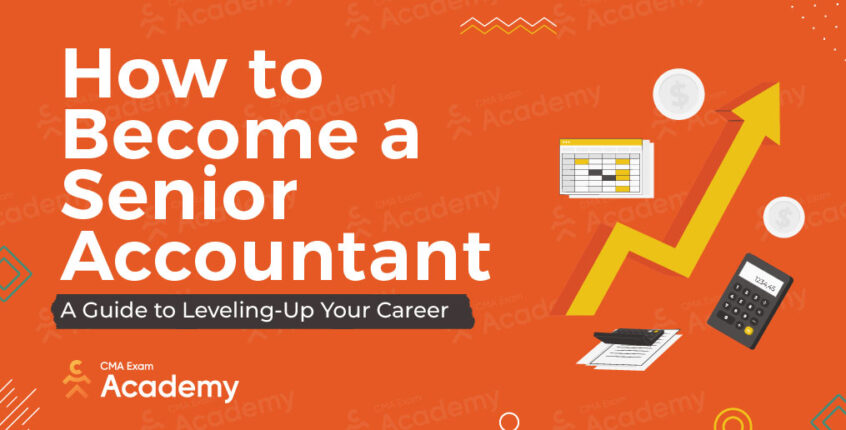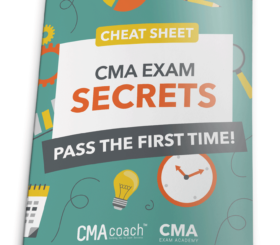At the beginning of your accounting career, a position like senior accountant might seem out of reach. This highly sought-after accounting job is an end goal for many professionals and a stepping stone toward other roles, such as CFO or corporate controller.
Whatever your goals, the path to becoming a senior accountant is not as long as you may think. The key is to orient yourself early in your journey. This way, you can minimize distractions and detours to make only the most strategic decisions that will get you closer to your dream job.
Throughout my career, I’ve connected with thousands of professionals at every stage of their careers. I’ve learned many ways to become a senior accountant, and let me tell you: some are better than others.
Keep reading to learn the best way to become a senior accountant.
I’ll let you in on the secrets in this post:
- Senior Accountant Education Requirements
- Senior Accountant Skills
- Senior Accountant Responsibilities
- Senior Accountant Salary
- How to Become a Senior Accountant
- Level up Your Career With CMA Exam Academy
Senior Accountant Education Requirements
Senior accountants have a lot on their plates. They are responsible for some of the most important tasks among teams of bookkeepers and accountants. This means they need to have a sophisticated understanding of all aspects of accounting and financial management.
The minimum education requirement for senior accountants is a bachelor’s degree in accounting or finance.
That said, it’s difficult for a professional to secure their first senior accountant position with an undergraduate degree alone. While some may opt to pursue graduate studies – an MBA, for example – most choose a professional certificate like CMA.
Earning your CMA is challenging but significantly easier and more affordable than pursuing an MBA. The CMA is a highly respected credential and requires a great deal of skill. It’s a great way to set yourself apart from other senior accountant candidates.
Senior Accountant Skills
Before you begin working as a senior accountant, you’ll have to gather a few key skills:
- Management and teamwork: hiring managers will want to see proof of collaboration and leadership abilities during the hiring process. Even though senior accountants are not technically managers, they’re required to lead by example within their teams. Those selected for these roles are often groomed by their company for future leadership positions. Management skills could give you an advantage in this.
- Financial management: the management of a company’s finances will be high on your list of priorities as a senior accountant. Gather as much experience in this area as possible.
- Financial planning & analysis: one thing that sets senior accountants apart from junior and staff accountants is their ability to project and forecast a company’s future. This vital skill will serve you well as you climb your career ladder. It will also help you complete the analytics and assessment tasks your CFO or controller may ask of you.
- Strategic planning: demonstrating your organizational, problem-solving, and critical thinking abilities is a great way to show hiring managers that you’re ready to craft strategies to help the company achieve its goals.
There’s only one way to get these skills: experience. On average, senior accountants have between 3 – 5 years of professional experience before they land their first role.
Some of this can be earned during education as a part of an internship and work placement fulfillment, but the majority will have to be completed separately.
Senior Accountant Responsibilities
While not officially managers, senior accountants are considered leaders in their organizations. It’s often an accounting professional’s first step into a managerial position and can lead to other great positions like corporate controller and CFO.
Some of the responsibilities of a senior accountant include:
- Crafting and presenting financial reports
- Managing a business’s general ledger
- Completing account reconciliations
- Assisting with financial forecasts
- Preparing tax returns
- Completing payroll
Senior accountants should be experts in accounting so they can step up and assist wherever their skills are needed.
Senior Accountant Salary
The starting senior accountant salary is a step up from a junior or staff accountant. The rate ranges based on the amount of experience you have.
The average senior accountant’s salary is $72,575. That figure could be closer to $57,000 for those just starting their career. Professionals with more experience might be looking at a figure nearing $90,000.
There is a way to increase your chances of securing a starting salary on the high end of that scale.
Research shows that professionals with certifications like the CMA outearn their noncertified peers by as much as 58%. Talk about an impressive ROI.
I wrote a comprehensive guide to CMA salaries around the world using data from the official IMA annual survey, so be sure to check that out if you want to chart a career path for yourself.
How to Become a Senior Accountant
If you’re still reading, I’ve hopefully convinced you to take the next step in your accounting career.
Ready to get started? Here’s how.
Get an Accounting Education
An undergraduate degree is a must for senior accountants. My recommendation is to pursue a bachelor’s in accounting or finance.
If you’re at the very beginning of your career, start by enrolling in a university. Dedicate yourself to learning everything you can about the accounting profession.
If you already have a degree in a related field, like business management, don’t worry. Some education options won’t require you to dedicate tens of thousands of dollars and four years.
Pursuing a professional certificate like the CPA or CMA is the best strategy for enhancing your education. My favorite option is the CMA. It’s affordable and takes comparatively less time than most other options. Plus, it looks great on a resume. But you should do the research for yourself before deciding which is better for your goals.
Develop Your Skills
There are many ways to gain the skills hiring managers value most. And you should commit to developing these skills throughout your professional and educational journey. This means:
- Seek out internships during your undergraduate degree when possible. Internships are a terrific way to gain experience and professional skills. They also reflect positively on your character. Hiring managers want team players genuinely committed to professional and personal development. Especially when they’re looking for senior team members who will set an example for the junior and staff accountants on the team.
- Training across departments, even when the skills you’ll be training fall outside the scope of your current role. As a senior accountant, you’ll likely have a longer list of responsibilities. So, build skills that will show hiring managers your breadth of experience. Undergoing training modules demonstrates a learning mindset and a willingness to step outside your comfort zone.
Meet the Requirements
Remember the education and work experience requirements we discussed earlier? Once you reach this point in your journey to becoming a senior accountant, you’ll probably have several boxes checked off.
It’s time to do an audit of what requirements you still need to fulfill:
- Education: work hard in school and seize opportunities further your understanding of accounting and financial management.
- Professional certificates: demonstrate that you have the skills required to excel in an accounting leadership position with a professional certification such as the CMA.
- Work experience: gain at least three years of experience working as a junior or staff accountant or auditor. Remember that senior accountants are experts in their field, so resist the temptation to get too comfortable. Take on extra responsibilities and support other team members when you see opportunities to do so. You’ll end up with a broader range of skills and a reputation as a reliable employee.
- Bonus: while building up your requirements, you should also focus on your network. Making connections in school and during your time as a professional could make or break your ability to land your dream role. So make sure to prioritize this.
Prepare a Proper Resume
Once you’ve checked off all the boxes, it’s time for the fun part: applying for jobs.
Start by crafting a resume that shows hiring managers what you’re made of.
Creating a great first impression on a single 9X11 sheet of paper is no easy task, but I’ve got a few tips to make it easier.
You can check out my complete guide to creating a glowing resume or read the highlights below:
- Highlight your education: you worked hard in school. Make sure the hiring manager knows it – especially if the job description lists requirements. Include them on your resume.
- Showcase applicable skills and experiences: first, note what skills the job description lists. Then, compare them with your skills and experiences. Notice any overlap? Put those skills at the very top.
- Mention directly relevant experiences in your cover letter: this is my secret to standing out straight from the start. Too many accountants submit generic cover letters. If yours shows direct experience with the responsibilities listed in the job description, you’ll be off to a great start.
Apply for Senior Accountant Jobs
Now you’re ready to hit submit.
Don’t worry if this part takes longer than you’d hoped. It’s normal, especially for those early in their careers.
Here are some tips to keep you motivated:
- Use your network: it’s a competitive market out there. If you know someone who works at the company you’re applying to, reach out and ask if they have advice. They might even put in a good word for you if you’ve left a good impression. Sometimes, who you know can make all the difference.
- Embrace the power of LinkedIn: many professionals are shy to use LinkedIn to market themselves. But when done correctly, a strong personal brand can have a powerful impact on your professional opportunities. Who knows, hiring managers might even reach out to offer interviews for positions you didn’t even know about.
If you’re finding that this section is taking a long time – keeping in mind the average is about six months – then it might be time to revisit the earlier steps.
Ask how you can make yourself a more attractive candidate. Add a professional certificate or new experience to your resume, then revisit this step with a renewed sense of confidence.
Seek Out Internal Job Opportunities
If you have a good reason to leave your current company, then by all means, do so. But there are a lot of benefits to seeking promotions within your current organization.
Applying to an internal role will be slightly different from an external one. For example, you don’t typically need to invest as much time showing your work experience. But you will need to demonstrate that you’re committed to professional development.
A great way to do this is by pursuing training or certifications outside of your organization. Often, your company might even pay for you to do so.
You can wait for a role to open up or schedule a meeting with your manager about your career path within the company. Chances are, management will be impressed with your tenacity and want to help you grow.
Level up Your Career With CMA Exam Academy
Ready to take the next step?
There are a lot of places where you could start. If you’re considering pursuing a professional certification, I recommend the CMA. It’s affordable, highly regarded, and comparably accessible in terms of education.
That said, passing the exam isn’t easy. It requires an immense amount of dedication. But if it were easy, everyone would do it.
I encourage all the accountants I meet not to let the exam process intimidate them. Getting a CMA is a massive investment in your future. And with an earning potential approximately 58% higher than non-CMAs, the ROI is undeniable.
To get started, check out my CMA 16-Week Accelerator program. It’s designed to save you hours of study time and is guaranteed to help you pass.

Hi, I’m Nathan Liao (aka the CMA Coach)! For the last 10 years, over 82,000 accounting and finance pros came knocking at my door seeking guidance and help. If you’re also aiming to conquer the CMA exam on your very first try—without wasting away time or money—you’ve found your ultimate guide. Dive in deeper to discover more about me and the dedicated team that powers CMA Exam Academy. Click here and let’s embark on this journey together!


